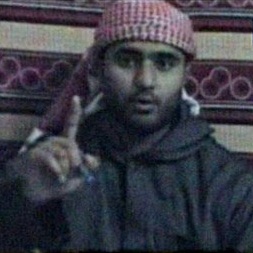Mohammed Junaid Babar
Mohammed Junaid Babar was the prosecution's star witness. He was flown to London to give evidence in the case, and arrived at court amid heavy security, driven from a police station in an armoured convoy with a helicopter overhead. [8]
The prosecution claimed that he was part of the plot and had "an insight as an insider into the events and plans, which an outsider could not have."
He was given immunity from prosecution in relation to the charges the British defendants face. [9]
He claims to have stolen three computers from a software company he worked for in Peshawar and given them to Mahmood because they were needed by Al Qaeda. The company was run by the older brother of one of the founder members of al-Muhajiroun. [10]
The trial began in March 2006, and the prosecution ran its charges until the end of August. The allegations brought up by the witness testimony and evidence included the following:
- Possession of a 600 kg bag of ammonium nitrate fertiliser "which could have been used to make bombs". [9]
- Planning to hide ammonium nitrate in bags of dried fruit so that it could be shipped to the UK by Federal Express. [11]
- Conspiring with Mohammed Momin Khawaja, a Canadian, and other unknown persons to "cause... an explosion... of a nature likely to endanger life". [9]
- Working for Abdul Hadi, said to be number three in Al Qaeda. [9]
- Planning to transport detonators inside small radios [9] or bottles of shampoo or shaving cream from Pakistan to the UK via Iran, Turkey, eastern Europe, and Belgium. [11]
- Planning to buy a radio-isotope bomb from the Russian mafia in Belgium. [12]
- Plotting to poison football crowds by selling spiked drinks at matches, and sell poisoned food from a takeaway restaurant. [13]
- Receiving terrorist training in the use of explosives in Pakistan. [14]
- Planning to set off explosions in shopping centres, nightclubs, synagogues, and disrupt electricity and gas supplies. [12] The police played secret recordings during the trial made in February 2004 of the suspects discussing potential targets. [15]
- Plotting to emulate the 11 September 2001 attacks by finding 30 "brothers" willing to commit suicide and crash a plane. [16] (This discussion was also caught on tape.)
Omar Khyam's defence testimony began with him telling the court of his gradual conversion to militant jihadist and wish to help the fighters in Kashmir and Afghanistan. [17]
Then, on 18 September, to the surprise of his defence counsel, Khyam refused to give any more evidence, stating that the ISI in Pakistan has had words with his family and were worried that he might reveal more about them. He added: "right now, as much as I want to clarify matters, the priority for me has to be the safety of my family so I am going to stop." He assured the judge that he understood that his refusal to answer questions might cause the jury to be suspicious. [18]
Salahuddin Amin's testimony consisted of claims that he had been tortured by his Pakistani jailers during his 10-month detention, and that this must have been known to the US and British officials who interviewed him numerous times during his detention. He said he confessed to being involved in a plot to buy an "isotope bomb" after being hung up by his wrists and beaten on his back and "things" with the lashes, and threatened to be raped by the handle. [19]
Nabeel Hussain, who loaned the money to pay for the storage of ammonium nitrate, claimed he thought it was sand. [20]
Counsel for Shujah Mahmood, who was only 16 at the time of the events, claimed he was not aware of the plot and was merely taken advantage of by his older brother. [21]
Judge Sir Michael Astill announced on 20 April 2007 that he would accept a majority verdict in the case. [22] On 30 April, Omar Khyam, Waheed Mahmood, Jawad Akbar, Salahuddin Amin, and Anthony Garcia were found guilty of conspiring to cause explosions likely to endanger life between 1 January 2003 and 31 March 2004. [23] Shujah Mahmood and Nabeel Hussain were found not guilty of all charges.
The defendants found guilty were sentenced to life imprisonment. Omar Khyam was given a minimum term of 20 years, Anthony Garcia 20 years, Jawad Akbar 17½ years, Waheed Mahmood 20 years and Salahuddin Amin 17½ years. [2]
Momin Khawaja was found guilty in Canada’s first terrorism trial on charges of helping to develop bomb detonators, possession of explosives, helping to finance terrorist activity, receiving terrorist training and facilitating terrorism. On March 12, 2009 he was sentenced to 10.5 years in prison which was later increased to Life-24. [24]







